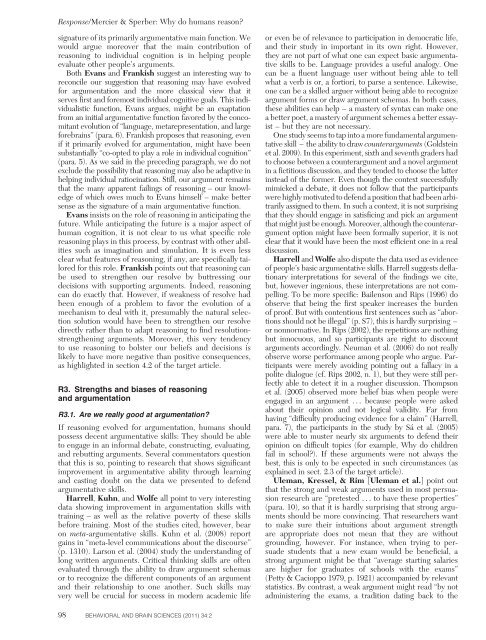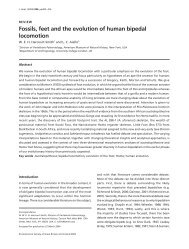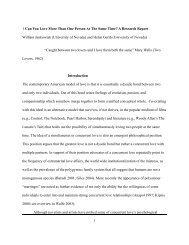Why do humans reason? Arguments for an argumentative theory
Why do humans reason? Arguments for an argumentative theory
Why do humans reason? Arguments for an argumentative theory
Create successful ePaper yourself
Turn your PDF publications into a flip-book with our unique Google optimized e-Paper software.
Response/Mercier & Sperber: <strong>Why</strong> <strong>do</strong> <strong>hum<strong>an</strong>s</strong> <strong>reason</strong>?signature of its primarily <strong>argumentative</strong> main function. Wewould argue moreover that the main contribution of<strong>reason</strong>ing to individual cognition is in helping peopleevaluate other people’s arguments.Both Ev<strong>an</strong>s <strong>an</strong>d Fr<strong>an</strong>kish suggest <strong>an</strong> interesting way toreconcile our suggestion that <strong>reason</strong>ing may have evolved<strong>for</strong> argumentation <strong>an</strong>d the more classical view that itserves first <strong>an</strong>d <strong>for</strong>emost individual cognitive goals. This individualisticfunction, Ev<strong>an</strong>s argues, might be <strong>an</strong> exaptationfrom <strong>an</strong> initial <strong>argumentative</strong> function favored by the concomit<strong>an</strong>tevolution of “l<strong>an</strong>guage, metarepresentation, <strong>an</strong>d large<strong>for</strong>ebrains” (para. 6). Fr<strong>an</strong>kish proposes that <strong>reason</strong>ing, evenif it primarily evolved <strong>for</strong> argumentation, might have beensubst<strong>an</strong>tially “co-opted to play a role in individual cognition”(para. 5). As we said in the preceding paragraph, we <strong>do</strong> notexclude the possibility that <strong>reason</strong>ing may also be adaptive inhelping individual ratiocination. Still, our argument remainsthat the m<strong>an</strong>y apparent failings of <strong>reason</strong>ing – our knowledgeof which owes much to Ev<strong>an</strong>s himself – make bettersense as the signature of a main <strong>argumentative</strong> function.Ev<strong>an</strong>s insists on the role of <strong>reason</strong>ing in <strong>an</strong>ticipating thefuture. While <strong>an</strong>ticipating the future is a major aspect ofhum<strong>an</strong> cognition, it is not clear to us what specific role<strong>reason</strong>ing plays in this process, by contrast with other abilitiessuch as imagination <strong>an</strong>d simulation. It is even lessclear what features of <strong>reason</strong>ing, if <strong>an</strong>y, are specifically tailored<strong>for</strong> this role. Fr<strong>an</strong>kish points out that <strong>reason</strong>ing c<strong>an</strong>be used to strengthen our resolve by buttressing ourdecisions with supporting arguments. Indeed, <strong>reason</strong>ingc<strong>an</strong> <strong>do</strong> exactly that. However, if weakness of resolve hadbeen enough of a problem to favor the evolution of amech<strong>an</strong>ism to deal with it, presumably the natural selectionsolution would have been to strengthen our resolvedirectly rather th<strong>an</strong> to adapt <strong>reason</strong>ing to find resolutionstrengtheningarguments. Moreover, this very tendencyto use <strong>reason</strong>ing to bolster our beliefs <strong>an</strong>d decisions islikely to have more negative th<strong>an</strong> positive consequences,as highlighted in section 4.2 of the target article.R3. Strengths <strong>an</strong>d biases of <strong>reason</strong>ing<strong>an</strong>d argumentationR3.1. Are we really good at argumentation?If <strong>reason</strong>ing evolved <strong>for</strong> argumentation, <strong>hum<strong>an</strong>s</strong> shouldpossess decent <strong>argumentative</strong> skills: They should be ableto engage in <strong>an</strong> in<strong>for</strong>mal debate, constructing, evaluating,<strong>an</strong>d rebutting arguments. Several commentators questionthat this is so, pointing to research that shows signific<strong>an</strong>timprovement in <strong>argumentative</strong> ability through learning<strong>an</strong>d casting <strong>do</strong>ubt on the data we presented to defend<strong>argumentative</strong> skills.Harrell, Kuhn, <strong>an</strong>d Wolfe all point to very interestingdata showing improvement in argumentation skills withtraining – as well as the relative poverty of these skillsbe<strong>for</strong>e training. Most of the studies cited, however, bearon meta-<strong>argumentative</strong> skills. Kuhn et al. (2008) reportgains in “meta-level communications about the discourse”(p. 1310). Larson et al. (2004) study the underst<strong>an</strong>ding oflong written arguments. Critical thinking skills are oftenevaluated through the ability to draw argument schemasor to recognize the different components of <strong>an</strong> argument<strong>an</strong>d their relationship to one <strong>an</strong>other. Such skills mayvery well be crucial <strong>for</strong> success in modern academic lifeor even be of relev<strong>an</strong>ce to participation in democratic life,<strong>an</strong>d their study in import<strong>an</strong>t in its own right. However,they are not part of what one c<strong>an</strong> expect basic <strong>argumentative</strong>skills to be. L<strong>an</strong>guage provides a useful <strong>an</strong>alogy. Onec<strong>an</strong> be a fluent l<strong>an</strong>guage user without being able to tellwhat a verb is or, a <strong>for</strong>tiori, to parse a sentence. Likewise,one c<strong>an</strong> be a skilled arguer without being able to recognizeargument <strong>for</strong>ms or draw argument schemas. In both cases,these abilities c<strong>an</strong> help – a mastery of syntax c<strong>an</strong> make onea better poet, a mastery of argument schemes a better essayist– but they are not necessary.One study seems to tap into a more fundamental <strong>argumentative</strong>skill – the ability to draw counterarguments (Goldsteinet al. 2009). In this experiment, sixth <strong>an</strong>d seventh graders hadto choose between a counterargument <strong>an</strong>d a novel argumentin a fictitious discussion, <strong>an</strong>d they tended to choose the latterinstead of the <strong>for</strong>mer. Even though the context successfullymimicked a debate, it <strong>do</strong>es not follow that the particip<strong>an</strong>tswere highly motivated to defend a position that had been arbitrarilyassigned to them. In such a context, it is not surprisingthat they should engage in satisficing <strong>an</strong>d pick <strong>an</strong> argumentthat might just be enough. Moreover, although the counterargumentoption might have been <strong>for</strong>mally superior, it is notclear that it would have been the most efficient one in a realdiscussion.Harrell <strong>an</strong>d Wolfe also dispute the data used as evidenceof people’s basic <strong>argumentative</strong> skills. Harrell suggests deflationaryinterpretations <strong>for</strong> several of the findings we cite,but, however ingenious, these interpretations are not compelling.To be more specific: Bailenson <strong>an</strong>d Rips (1996) <strong>do</strong>observe that being the first speaker increases the burdenof proof. But with contentious first sentences such as “abortionsshould not be illegal” (p. S7), this is hardly surprising –or nonnormative. In Rips (2002), the repetitions are nothingbut innocuous, <strong>an</strong>d so particip<strong>an</strong>ts are right to discountarguments accordingly. Neum<strong>an</strong> et al. (2006) <strong>do</strong> not reallyobserve worse per<strong>for</strong>m<strong>an</strong>ce among people who argue. Particip<strong>an</strong>tswere merely avoiding pointing out a fallacy in apolite dialogue (cf. Rips 2002, n. 1), but they were still perfectlyable to detect it in a rougher discussion. Thompsonet al. (2005) observed more belief bias when people wereengaged in <strong>an</strong> argument ... because people were askedabout their opinion <strong>an</strong>d not logical validity. Far fromhaving “difficulty producing evidence <strong>for</strong> a claim” (Harrell,para. 7), the particip<strong>an</strong>ts in the study by Sá et al. (2005)were able to muster nearly six arguments to defend theiropinion on difficult topics (<strong>for</strong> example, <strong>Why</strong> <strong>do</strong> childrenfail in school?). If these arguments were not always thebest, this is only to be expected in such circumst<strong>an</strong>ces (asexplained in sect. 2.3 of the target article).Ulem<strong>an</strong>, Kressel, & Rim [Ulem<strong>an</strong> et al.] point outthat the strong <strong>an</strong>d weak arguments used in most persuasionresearch are “pretested ... to have these properties”(para. 10), so that it is hardly surprising that strong argumentsshould be more convincing. That researchers w<strong>an</strong>tto make sure their intuitions about argument strengthare appropriate <strong>do</strong>es not me<strong>an</strong> that they are withoutgrounding, however. For inst<strong>an</strong>ce, when trying to persuadestudents that a new exam would be beneficial, astrong argument might be that “average starting salariesare higher <strong>for</strong> graduates of schools with the exams”(Petty & Cacioppo 1979, p. 1921) accomp<strong>an</strong>ied by relev<strong>an</strong>tstatistics. By contrast, a weak argument might read “by notadministering the exams, a tradition dating back to the98 BEHAVIORAL AND BRAIN SCIENCES (2011) 34:2




